非谓语动词独立主格
图片预览


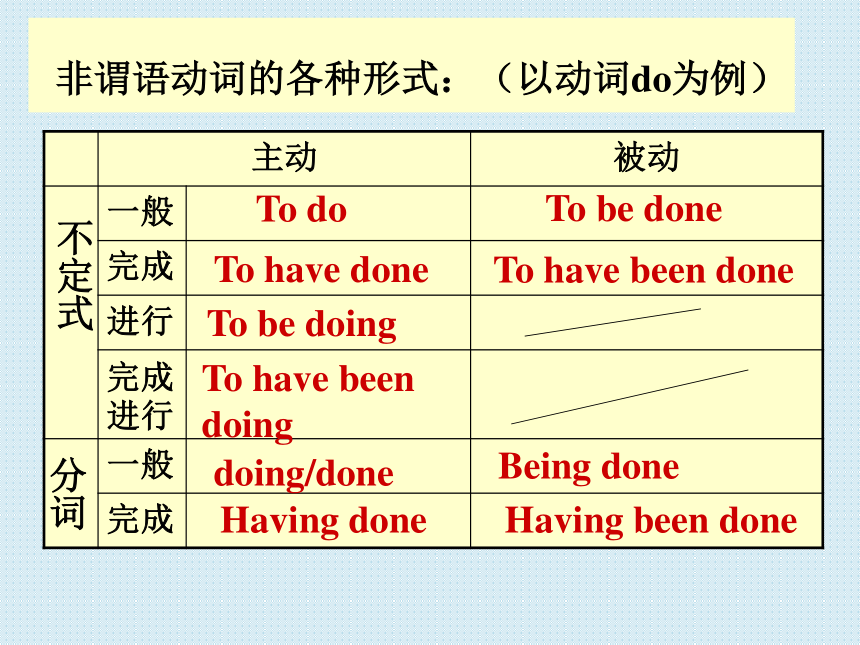
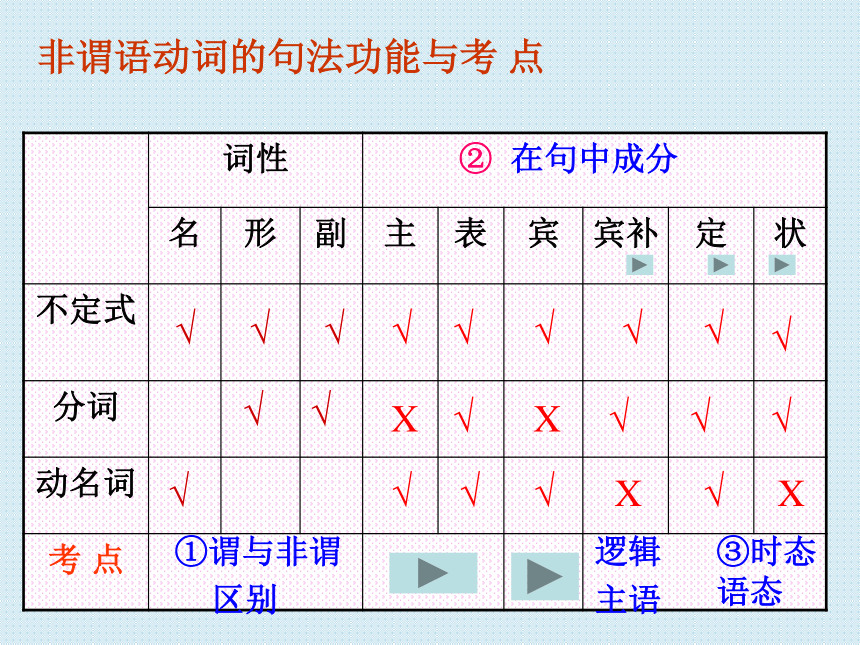
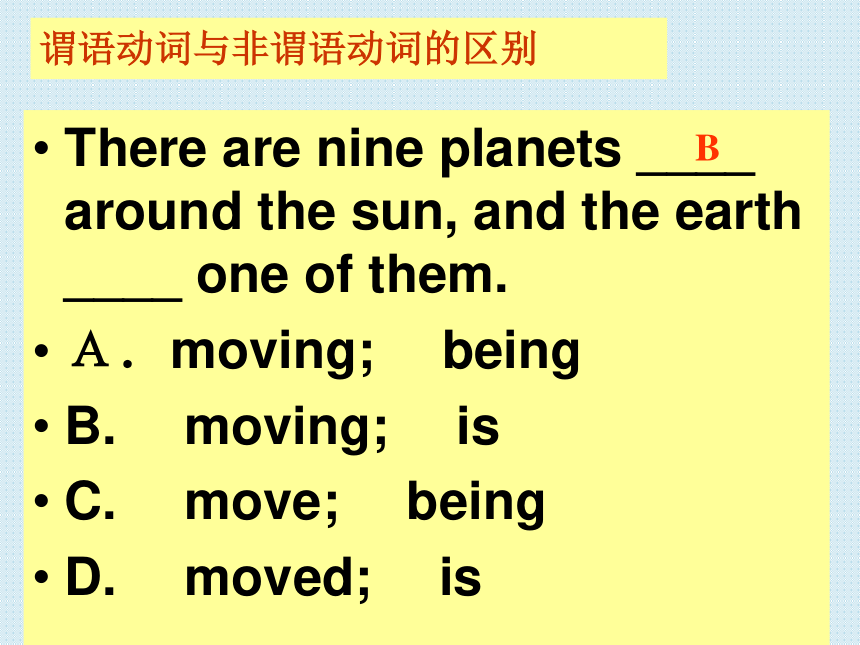
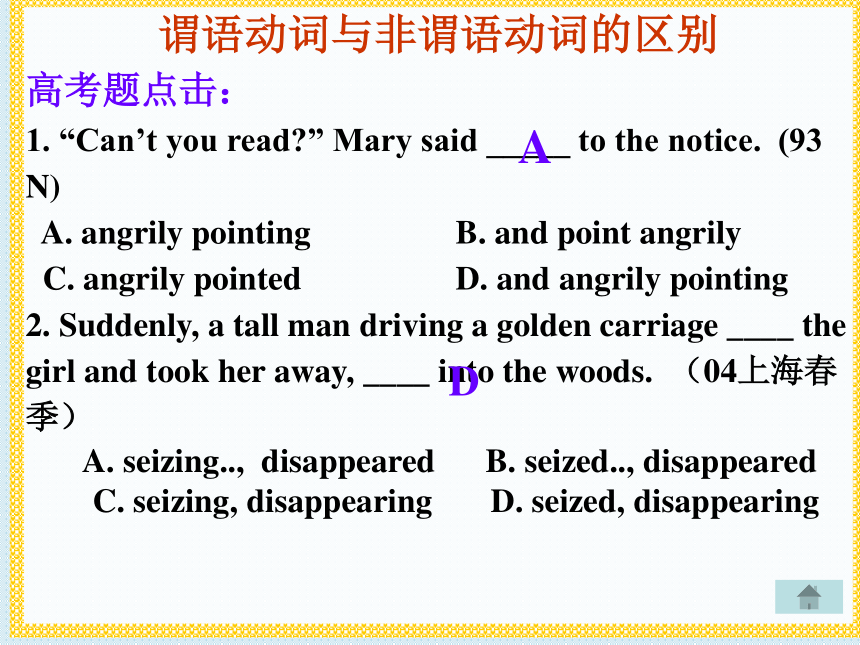
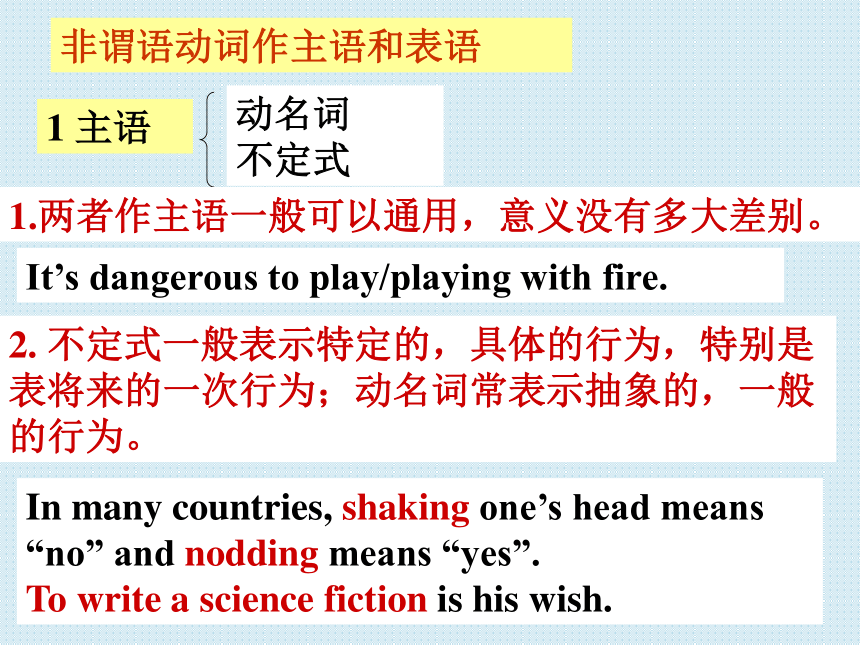

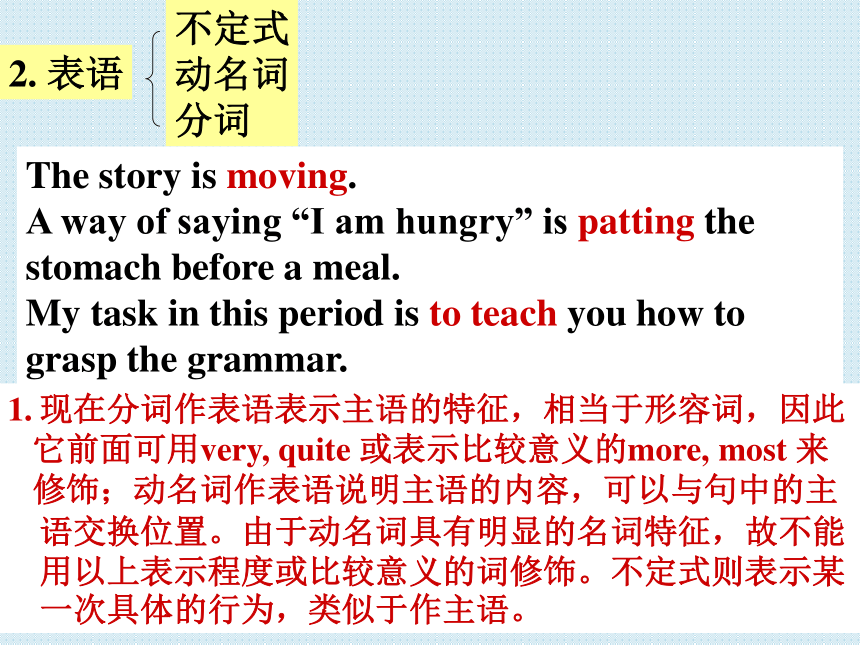
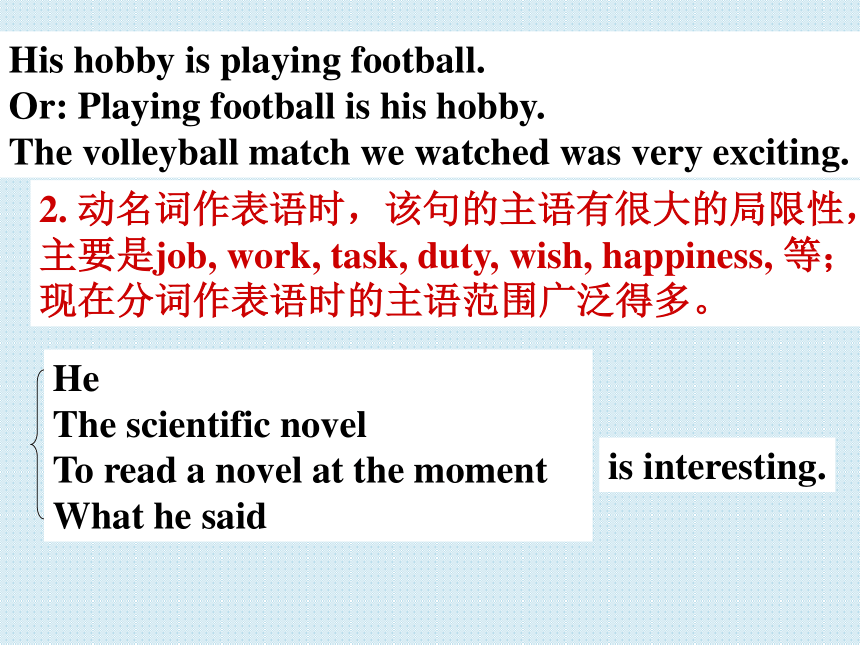


文档简介
课件65张PPT。08年高考语法复习非谓语动词I want to read a book written by the woman living there.to readwrittenliving 非谓语动词的各种形式:(以动词do为例)不定式分词To doTo be doneTo have doneTo have been doneTo be doingTo have been
doingdoing/doneBeing doneHaving doneHaving been done非谓语动词的句法功能与考 点√√√√√√√√√√√√√√√√√√√√XXXX①谓与非谓
区别逻辑
主语③时态
语态②There are nine planets ____ around the sun, and the earth ____ one of them.
A.moving; being
B. moving; is
C. move; being
D. moved; is谓语动词与非谓语动词的区别B谓语动词与非谓语动词的区别
高考题点击:
1. “Can’t you read?” Mary said _____ to the notice. (93 N)
A. angrily pointing B. and point angrily
C. angrily pointed D. and angrily pointing
2. Suddenly, a tall man driving a golden carriage ____ the girl and took her away, ____ into the woods. (04上海春季)
A. seizing.., disappeared B. seized.., disappeared
C. seizing, disappearing D. seized, disappearing
AD1 主语动名词
不定式In many countries, shaking one’s head means “no” and nodding means “yes”.
To write a science fiction is his wish.It’s dangerous to play/playing with fire.1.两者作主语一般可以通用,意义没有多大差别。2. 不定式一般表示特定的,具体的行为,特别是
表将来的一次行为;动名词常表示抽象的,一般
的行为。非谓语动词作主语和表语It is no use _______(argue) with him about that.arguing3. 在含有no, -less,常用动名词短语作主语。
Eg.
It is no use doing….; It is useless doing…
It is no good doing…; It is no help doing… 高考语法手册 P1032. 表语不定式
动名词
分词The story is moving.
A way of saying “I am hungry” is patting the stomach before a meal.
My task in this period is to teach you how to grasp the grammar.现在分词作表语表示主语的特征,相当于形容词,因此
它前面可用very, quite 或表示比较意义的more, most 来
修饰;动名词作表语说明主语的内容,可以与句中的主语交换位置。由于动名词具有明显的名词特征,故不能用以上表示程度或比较意义的词修饰。不定式则表示某一次具体的行为,类似于作主语。His hobby is playing football.
Or: Playing football is his hobby.
The volleyball match we watched was very exciting.2. 动名词作表语时,该句的主语有很大的局限性,主要是job, work, task, duty, wish, happiness, 等;现在分词作表语时的主语范围广泛得多。He
The scientific novel
To read a novel at the moment
What he saidis interesting.非谓语动词作主语和表语
高考题点击:
1. Fishing is his favorite hobby, and _____. (01 上海)
A. he’d like to collect coins as well
B. he feels like collecting coins, too
C. to collect coins is also his hobby
D. collecting coins also gives him great pleasure
2. It’s necessary to be prepared for a job interview. ____ the answers ready will be of great help. (05北京卷)
A. To have had B. Having had C. Have D. HavingDD非谓语动词作主语时要注意以下两个重要问题:第一是并行结构问题,如:Seeing is believing. / To see is to believe.
第二需要注意一些结构:
A) 在 It’s no use (good; value; importance) 等结构中只用动名
词作主语。如:It’s no use quarrelling with such a fellow .
注意比较:There’s no need to tell him about it.
B) 在 It’s + adj. 结构中都用不定式作主语。注意两种句型:
It’s easy (difficult, hard, important, possible, impossible,
comfortable, necessary, better; the first, the next, the last,
the best, too much, too little, not enough) 后加 for sb. to do
It’s kind (nice, stupid, rude, clever, foolish, thoughtful,
thoughtless, brave, considerate (考虑周到的), silly,
selfish (自私的) )后加 of sb. to do 高考语法手册 P993. The purpose of new technologies is to make life easier,
_____ it more difficult. (99 N)
A. not make B. not to make C. not making D. do not make
B动词不定式短语 to make life easier 及 not to make it more
difficult 都作 purpose 的表语。非谓语动词作表语时要特
别注意两个问题,一是并行结构问题,二是时间问题。一般来说,不定式作表语都表示该动作发生在将来,故在表示“目的、愿望、梦想、需求”等名词作主语时其表语应该用不定式。动名词作表语一般用来表示“身份、职业”等。另外要特别注意现在分词和过去分词作表语的区别。找非谓语的逻辑主语 一、作定语时,被修饰的词是逻辑主语
二、作状语时,句子的主语是逻辑主语
三、作宾语补足语时,宾语是逻辑主语
定语动名词
分词
不定式Do you know the man talking with a black there?
The carrying pole reminds me of our bitter days in the past.
There will be many people to help you. =who is talking …The pole for carrying things非谓语动词作定语 1 所含时态意义the laughing audience
Have you read the book 20,000 Leagues Under the Sea written by Jules Verne?
The next boy to play went to the piano.
He is always the first one to get up.分词-正在进行或发生了的动作
不定式-尚未实现的将来的行为或表示一般性 叙述而无一定的时间性。
动名词-表示被修饰词的目的或用途
2 逻辑关系:
分词- 主谓关系(可改成定语从句)
动名词-表示被修饰词的目的或用途
不定式-多种逻辑关系The labto be built
being built
built last yearThe rising sun---the sun that is rising
A broken glass--- a glass that is broken
The light is off. Please give me some candles to give light. ( some candles that give light)
主谓关系
A hard job to do---a hard job that one must do
动宾关系
A place to rest---a place where one can rest
动状关系
The plan to open up rice fields
同谓关系3. 现在分词和过去分词falling leaves
fallen leavesexiting news
exited students-ing 令人…; -ed 表示所修饰词本身的特征a disappointing voice; a disappointed voice注意:1 现在分词作定语时,表示动作正在进行或与谓语动词的表示的动作几乎同时发生。如两个动作有先有后,一般不能用现在分词作定语,而要用定语从句。
1. The teacher criticized the student who had broken the window.
2. Yesterday, mother told me an event which happened five years ago. 非谓语动词作定语
高考题点击:
1. The flowers ____ sweet in the botanic garden attract the visitors to the beauty of nature. (04上海)
A. to smell B. smelling
C. smelt D. to be smelt
2. A man is being questioned in relation to the ________ murder last night. (04江苏)
A. advised B. attended
C. attempted D. admitted BC3. The picture _____ on the wall is painted by my nephew. (00 北京春季)
A. having hung B. hanging
C. hangs D. being hung
4. There are five pairs _____, but I’m at a loss which to buy. (99 上海)
A. to be chosen B. to choose from C. to choose D. for choosingBB非谓语动词作定语时要注意以下区别:
分词作定语时与其所修饰的名词有逻辑上的主谓关系;
动名词作定语时只表示用途、场所等意义;
不定式作定语时要注意以下一些固定结构:
在 time, chance, right 等名词后;
在序数词后;
在 wish, need, demand, requirement …等词后。
D)表示被动意义的非谓语动词作定语时的用法:
done 表示已经完成的动作
to be done 表示尚未开始的动作
being done 表示正在进行之中的动作S + Vt + O +to do / dodoing / done常接带to的不定式作宾补的动词有:
tell, ask, order, warn, advise, want,
wish, expect, persuade, encourage,
lead, get…
would love, would like, prefer, hate常接不带to的不定式作宾补的动词有:
一感:feel,
二听:hear,? listen?to,?
三让:have,? let,? make,
五看:see,? look?at,? observe,?
watch?,notice 注意: We made Tom do the work.
Tom was made to do the work.非谓语动词作宾补1. I found the snake eating the rat( 老鼠). 2. I found the rat( 老鼠) eaten by the snake. S + V + O +doingdone非谓语动词作宾补
高考题点击:
The boy wanted to ride his bicycle in the street, but his
mother told him _____. (95 N)
A. not to B. not to do C. not to it D. do not to
A为了避免重复,常用省略形式 to 来代替前面的动作。如:Would you like to visit our school? Yes, I’d like to.
有些动词后面需要用不定式作宾补,除 tell 外,常见的还
有:advise allow cause consider encourage forbid force intend order permit persuade remind request require urge warn ask wish want 等
特别注意: hope, agree, demand, suggest 等没有宾补。2. Paul doesn’t have to be made _____. He always works hard.
(95 N)
A. learn B. to learn
C. learned D. learning
3. A computer does only what thinking people _____. (99 上海)
have it do B. have it done
C. have done it D. having it doneBA4. The managers discussed the plan that they would like to see_____ the next year. (00 N)
A. carry out B. carrying out
C. carried out D. to carry out
5. The missing boys were last seen _____ near the river. (94 N)
playing B. to be playing
C. play D. to playCA6.In the dream Peter saw himself ___ by a fierce wolf, and he woke suddenly with a start. (06上海春)
A. chased
B. to be chased
C. be chased
D. having been chased A非谓语动词作宾语
高考题点击:
1. We agreed _____ here but so far she hasn’t turned up yet. (95 N)
A. having met B. meeting C. to meet D. to have met
2. I’ve worked with children before, so I know what to _____ in my new job. (00 N)
A. expected B. to expect
C. to be expecting D. expectsCB3. I really appreciate _____ to relax with you on this nice island. (01 上海)
A. to have had time
B. having time
C. to have time
D. to having timeB4. --- You were brave enough to raise objections at the meeting.
--- Well, now I regret _____ that. (95 N)
A. to do B. to be doing C. to have done D. having done
5. --- Let me tell you something about the journalists.
--- Don’t you remember _____ me the story yesterday?
(99 上海) A. told B. telling C. to tell D.to have told
6. In some parts of London, missing a bus means _____ for another hour. (02 上海春季)
A. waiting B. to wait C. wait D. to be waitingDBA7. How about the two of us ___ a walk down the garden? (93 N) A. to take B. take C. taking D. to be taking
8. --- I must apologize for _____ ahead of time.
--- That’s all right. (94 N)
A. letting you not know B. not letting you know
C. letting you know not D. letting not you know
9. Sandy could do nothing but _____ to his teacher that he was wrong. (01 上海春季)
A. admit B. admitted C. admitting D. to admit
CBA介词的宾语一般都用动名词,但有三个介词 but (except) / than / be about 后要接不定式作宾语。10. Rather than ____ on a crowded bus, he always prefers ____ a bicycle. (94 N)
A. ride … ride B. riding … ride
C. ride … to ride D. to ride … riding
注意 prefer 的几个常用句型:
prefer to do sth. than do sth.
prefer doing sth. to doing sth.
prefer + n. to + n.C11. Mr. Reed made up his mind to devote all he had to _____ some schools for poor children. (01 上海春季)
A. set up B. setting up C. have set up D. having set up
12. --- How do you deal with the disagreement between the
company and the customers?
--- The key _____ the problem is to meet the demand _____ by the customers. (02 北京)
A. to solving … making B. to solving … made
C. to solve … making D. to solve … made
BB要特别注意 to 的词性,分析其为介词还是不定式。
admit to,be accustomed to 习惯于, be used to ,stick to ,
turn to,devote oneself to ,be devoted to,look forward to,pay attention to, get down to 等 状语不定式
分词1.Every day he climbed to a high rock near his cave to keep watch.
2. Two years later, her father disappeared , never to return.
3. I’m very glad to have this stamp again.
4. It is too dark for us to see anything in the room.
5. He is old enough to look after himself.目的结果原因程度程度不定式主要作目的,结果和程度状语1. Once fleeing Germany, Einstein went first to France, then to Belgium…
2. Being a shy man, Einstein didn’t attend the great celebration.
3. The trainer appeared, followed by six little dog.
4. Given more time, I can do it better.
5. Weighing almost 100 jin, the stone was moved by him alone.
6. The boy stood up, obliging me to rise, too.时间原因方式,伴随条件让步结果1。分词在句中主要作时间,原因,方式或伴随,条件,让步,结果状语。分词和不定式作结果状语My grandfather lived to see the liberation of China.
Tony’s father died, leaving him a lot of money.
He went home, only to find his money stolen.(动作行为)(状态)2。不定式强调动作发生的过程或未曾料到的不愉快的结果;分词主要表示动作发生后所引起的结果状态或必然产生的结果。现在分词和过去分词作状语Many people come to theme parks, looking for thrills and entertainment.
Once published, his work became famous for the absence of rhyme at the end of each line.主语是分词所表示动作的执行者分词用doing / having done,如果是分词所表示动作的承受者,分词用done / having been done。注意:1。状态动词或相当于状态动词的一些词。She sat there, lost in thought.
After a day’s work, he went home, tired out.2. 一些使役性动词,如:disappoint / excite / surprise / move / interest / puzzle… 。非谓语动词作状语
高考题点击:
1. -Mum, why do you always make me eat an egg every day?
- _____ enough protein and nutrition as you are growing
up. (99 上海)
A. Get B. Getting C. To get D. To be getting
2. _____ late in the afternoon, Bob turned off the alarm.
(01 北京春季
A. To sleep B. Sleeping C. Sleep D. Having slept
3. In order to make our city green, _____. (02 上海春季)
A. it is necessary to have planted more trees
B. many more trees need to plant
C. our city needs more trees D. we must plant more treesCAD4. _____ in thought, he almost ran into the car in front of him. (96 N)
A. Losing B. Having lost C. Lost D. To lose
5. _____ the general state of his health, it may take him a while to recover from the operation. (00 北京春季)
A. Given B. To give C. Giving D. Having given
6. He sent me an E-mail, _____ to get further information.
(00 上海)
A. hoped B. hoping C. to hope D. hope
lose oneself in sth. 表示“陷入…”,主语 he 为 lose 的宾语。 given 作状语意为“考虑到”,意思相当于 considering。注意 hoping 为伴随状语而非目的状语,真正的目的是后面的 to get …。CAB7. The research is so designed that once _____ nothing can be done to change it. (02 N)
A. begins B. having begun
C. beginning D. begun
8. Finding her car stolen, _____. (01 上海).
A. a policeman was asked to help
B. the area was searching thoroughly
C. it was looked for everywhere
D. she hurried to a policeman for helpDD9.He hurried to the booking office only_______ that all the tickets had been sold out. (06全国2)
A. to tell B. to be told C. telling D. toldB10._____for the breakdown of the school computer network, Alice was in low spirits. (06福建)
A. Blaming B. Blamed
C. To blame D. To be blamedB非谓语动词的时态语态
高考题点击:
I would love _____ to the party last night but I had to work extra hours to finish a report. (97 N)
A. to go B. having gone C. going D. to have gone
2. Robert is said _____ abroad, but I don’t know what country he studied in. (99 N)
A. to have studied B. to study
C. to be studying D. to have been studying
DA would love to have done 表示本想去做,但没做成。 本题的关键是“what country he studied in”,由此可知事情发生在过去。根据上下文的语境确定时间---Li Ming is said ____ abroad. Do you know what
country
---Yes, In London.
A. to have studied B. to study
C. to be studying D. to have been studyinghe studied in ?
he will study in?
he studies in?ABCThe problem____ next is of great importance.
The building____ now is our future classroom.
The problem____ just now is of treat importance.
discussed
B. being built
C. to be discussed根据非谓语自带的时间状语确定时间A ______B __ C ___3. Do let your mother know all the truth. She appears _____
everything. (01 上海)
A. to tell B. to be told C. to be telling D. to have been told
4. Having a trip abroad is certainly good for the old couple, but it remains _____ whether they will enjoy it. (02 N)
A. to see B. to be seen C. seeing D. seen
本题中母亲被告知真象显然发生在以前,所以你现在没有
必要再隐瞒了。 remain 后接 to do,此处 it 指代的是后面的主语从句。他们是否喜欢有待于观察,此处应为被动。DB5. _____ to sunlight for too much time will do harm to one’s skin.(02 上海)
A. Exposed B. Having exposed
C. Being exposed D. After being exposed
6. _____ such heavy pollution already, it may now be too late to clean up the river. (01 N)
A. Having suffered B. Suffering C. To suffer D. Suffered
7. Tony was very unhappy for _____ to the party. (00 上海)
A. having not been invited B. not having invited
C. having not invited D. not having been invited该句缺主语,只能用动名词才能作主语。CAD8. With a lot of difficult problems _____, the newly-elected
president is having a hard time. (02 上海春季)
A. settled B. settling C. to settle D. being settled
with + n. / pron. + O.C. 构成一个独立主格结构,在句中作状语。用 settled 表示已经解决了的问题;用 being settled 表示正在被解决的问题;用 to be settled 表示将要被解决的问题。而此处的 to settle 是用来作定语修饰前面的 problems。另外还要注意一下分词的独立主格结构的基本用法。C独立主格结构 (一)构成------独立主格(名词或代词)后接to do, doing, done, 形容词、副词或介词短语构成,
名词(代词) +现在分词、过去分词;
名词(代词) +不定式;
名词(代词) +形容词;
名词(代词) +副词;
名词(代词) +介词短语
(二) 独立主格结构的特点:
1)独立主格结构的逻辑主语与句子的主语不同,它独立存在。
2)名词或代词与后面的分词,形容词,副词,不定 式,介词等是主谓关系。
3)独立主格结构一般有逗号与主句分开。
4)在句中作状语,并对主句进行补充说明。
5)它有自己逻辑上的主语,表达相对独立的意思
1、名词/代词 + to do
We divide the work, he to clean windows and I to sweep the floor.
A number of officials followed the emperor, some to hold his robe, others to adjust his girdle, and so on.
Here are the first two volumes, the third one to come out next month.2、名词/代词 + doing
It being fine, we decided to go for a picnic.
There being no bus or taxi then, we had to walk home.
There being nothing else to do, we left.
The problem having been settled, we ended our meeting.
The clock having struck 12, I went to bed.
3、名词/代词 + done
His voice drowned by the noise, the speaker interrupted his lecture.
Her wallet stolen, she had no money to buy even a bus ticket.
因为钱包被偷了,她甚至连买车票的钱也没有了。
4、名词/代词+adj. / adv.
I saw deep pools, the water blue like the sky.
我看见深深的池塘里,水蓝蓝的像天空。
The condition (being) favorable, he may succeed.
条件有利的话,他可能成功。
Summer (being) over, students returned to school.
夏天过去了,学生回到了学校。
All the lights on, our classroom building looks even more beautiful.5、名词/代词 + 介词短语
He came into the classroom, book in hand.
The men ran out of the burning house, many of them with their clothes on fire.
He went off, gun in hand.
The old man stood under a big tree, pipe in mouth.
在这个结构中,如果逻辑主语与介词短语中的名词都是单数名词,在这些名词前习惯上不用冠词。
He stood under a tree, hand in pocket.
= with a hand in his pocket.
以上结构均可以加上with,构成with的复合结构,其意义和用法同独立主格结构相同。
He came into the classroom, book in hand.
with a book in his hand.
His nose was running and his hands were shaking. He left the theater like that.
His nose running and his hands shaking, he left the theater.
考试结束了,我们开始放假。
When the test was finished, we began our holiday
The test finished, we began our holiday.
总统被谋杀了,举国上下沉浸在悲哀之中。
After the president was assassinated, the whole country was in deep sorrow.
The president assassinated, the whole country was in deep sorrow.1.(由于是星期天), we decided to go home.
2.(由向导带路), we set off on foot into the dark night.
3.(有那么多书要读), I can’t kill time by playing cards.
4. At the gate stood a PLA man,(手里握着枪).
5. (做完家庭作业), he went to bed. It being Sunday.
2. The guide leading the way (With the guide leading the way)
3.With so many books to read
4.gun in hand (with a gun in his hand)
5.The homework done / finished
(With his homework done / finished) 独立结构,是由独立主格(名词或代词)后接分词、形容词、不定式、介词短语或副词构成,在句中可作 伴随状语、时间状语、原因状语、条件状语或定语
1). The largest collection ever found in England was one of about 200,000 silver pennies, all of that over 600 years old. (高二上:Coins )
2). A team of 15 Indian experts are organizing a workforce of 400 Cambodians, most of whom are women. =most of them women.做定语3).The meeting over,we left the room.
4).He returned home,his face pale.
5).Time permitting,we’ll visit the Summer Palace.
6). There being no bus, I have to walk home.
做原因状语做伴随状语做条件状语做原因状语Good-bye!
doingdoing/doneBeing doneHaving doneHaving been done非谓语动词的句法功能与考 点√√√√√√√√√√√√√√√√√√√√XXXX①谓与非谓
区别逻辑
主语③时态
语态②There are nine planets ____ around the sun, and the earth ____ one of them.
A.moving; being
B. moving; is
C. move; being
D. moved; is谓语动词与非谓语动词的区别B谓语动词与非谓语动词的区别
高考题点击:
1. “Can’t you read?” Mary said _____ to the notice. (93 N)
A. angrily pointing B. and point angrily
C. angrily pointed D. and angrily pointing
2. Suddenly, a tall man driving a golden carriage ____ the girl and took her away, ____ into the woods. (04上海春季)
A. seizing.., disappeared B. seized.., disappeared
C. seizing, disappearing D. seized, disappearing
AD1 主语动名词
不定式In many countries, shaking one’s head means “no” and nodding means “yes”.
To write a science fiction is his wish.It’s dangerous to play/playing with fire.1.两者作主语一般可以通用,意义没有多大差别。2. 不定式一般表示特定的,具体的行为,特别是
表将来的一次行为;动名词常表示抽象的,一般
的行为。非谓语动词作主语和表语It is no use _______(argue) with him about that.arguing3. 在含有no, -less,常用动名词短语作主语。
Eg.
It is no use doing….; It is useless doing…
It is no good doing…; It is no help doing… 高考语法手册 P1032. 表语不定式
动名词
分词The story is moving.
A way of saying “I am hungry” is patting the stomach before a meal.
My task in this period is to teach you how to grasp the grammar.现在分词作表语表示主语的特征,相当于形容词,因此
它前面可用very, quite 或表示比较意义的more, most 来
修饰;动名词作表语说明主语的内容,可以与句中的主语交换位置。由于动名词具有明显的名词特征,故不能用以上表示程度或比较意义的词修饰。不定式则表示某一次具体的行为,类似于作主语。His hobby is playing football.
Or: Playing football is his hobby.
The volleyball match we watched was very exciting.2. 动名词作表语时,该句的主语有很大的局限性,主要是job, work, task, duty, wish, happiness, 等;现在分词作表语时的主语范围广泛得多。He
The scientific novel
To read a novel at the moment
What he saidis interesting.非谓语动词作主语和表语
高考题点击:
1. Fishing is his favorite hobby, and _____. (01 上海)
A. he’d like to collect coins as well
B. he feels like collecting coins, too
C. to collect coins is also his hobby
D. collecting coins also gives him great pleasure
2. It’s necessary to be prepared for a job interview. ____ the answers ready will be of great help. (05北京卷)
A. To have had B. Having had C. Have D. HavingDD非谓语动词作主语时要注意以下两个重要问题:第一是并行结构问题,如:Seeing is believing. / To see is to believe.
第二需要注意一些结构:
A) 在 It’s no use (good; value; importance) 等结构中只用动名
词作主语。如:It’s no use quarrelling with such a fellow .
注意比较:There’s no need to tell him about it.
B) 在 It’s + adj. 结构中都用不定式作主语。注意两种句型:
It’s easy (difficult, hard, important, possible, impossible,
comfortable, necessary, better; the first, the next, the last,
the best, too much, too little, not enough) 后加 for sb. to do
It’s kind (nice, stupid, rude, clever, foolish, thoughtful,
thoughtless, brave, considerate (考虑周到的), silly,
selfish (自私的) )后加 of sb. to do 高考语法手册 P993. The purpose of new technologies is to make life easier,
_____ it more difficult. (99 N)
A. not make B. not to make C. not making D. do not make
B动词不定式短语 to make life easier 及 not to make it more
difficult 都作 purpose 的表语。非谓语动词作表语时要特
别注意两个问题,一是并行结构问题,二是时间问题。一般来说,不定式作表语都表示该动作发生在将来,故在表示“目的、愿望、梦想、需求”等名词作主语时其表语应该用不定式。动名词作表语一般用来表示“身份、职业”等。另外要特别注意现在分词和过去分词作表语的区别。找非谓语的逻辑主语 一、作定语时,被修饰的词是逻辑主语
二、作状语时,句子的主语是逻辑主语
三、作宾语补足语时,宾语是逻辑主语
定语动名词
分词
不定式Do you know the man talking with a black there?
The carrying pole reminds me of our bitter days in the past.
There will be many people to help you. =who is talking …The pole for carrying things非谓语动词作定语 1 所含时态意义the laughing audience
Have you read the book 20,000 Leagues Under the Sea written by Jules Verne?
The next boy to play went to the piano.
He is always the first one to get up.分词-正在进行或发生了的动作
不定式-尚未实现的将来的行为或表示一般性 叙述而无一定的时间性。
动名词-表示被修饰词的目的或用途
2 逻辑关系:
分词- 主谓关系(可改成定语从句)
动名词-表示被修饰词的目的或用途
不定式-多种逻辑关系The labto be built
being built
built last yearThe rising sun---the sun that is rising
A broken glass--- a glass that is broken
The light is off. Please give me some candles to give light. ( some candles that give light)
主谓关系
A hard job to do---a hard job that one must do
动宾关系
A place to rest---a place where one can rest
动状关系
The plan to open up rice fields
同谓关系3. 现在分词和过去分词falling leaves
fallen leavesexiting news
exited students-ing 令人…; -ed 表示所修饰词本身的特征a disappointing voice; a disappointed voice注意:1 现在分词作定语时,表示动作正在进行或与谓语动词的表示的动作几乎同时发生。如两个动作有先有后,一般不能用现在分词作定语,而要用定语从句。
1. The teacher criticized the student who had broken the window.
2. Yesterday, mother told me an event which happened five years ago. 非谓语动词作定语
高考题点击:
1. The flowers ____ sweet in the botanic garden attract the visitors to the beauty of nature. (04上海)
A. to smell B. smelling
C. smelt D. to be smelt
2. A man is being questioned in relation to the ________ murder last night. (04江苏)
A. advised B. attended
C. attempted D. admitted BC3. The picture _____ on the wall is painted by my nephew. (00 北京春季)
A. having hung B. hanging
C. hangs D. being hung
4. There are five pairs _____, but I’m at a loss which to buy. (99 上海)
A. to be chosen B. to choose from C. to choose D. for choosingBB非谓语动词作定语时要注意以下区别:
分词作定语时与其所修饰的名词有逻辑上的主谓关系;
动名词作定语时只表示用途、场所等意义;
不定式作定语时要注意以下一些固定结构:
在 time, chance, right 等名词后;
在序数词后;
在 wish, need, demand, requirement …等词后。
D)表示被动意义的非谓语动词作定语时的用法:
done 表示已经完成的动作
to be done 表示尚未开始的动作
being done 表示正在进行之中的动作S + Vt + O +to do / dodoing / done常接带to的不定式作宾补的动词有:
tell, ask, order, warn, advise, want,
wish, expect, persuade, encourage,
lead, get…
would love, would like, prefer, hate常接不带to的不定式作宾补的动词有:
一感:feel,
二听:hear,? listen?to,?
三让:have,? let,? make,
五看:see,? look?at,? observe,?
watch?,notice 注意: We made Tom do the work.
Tom was made to do the work.非谓语动词作宾补1. I found the snake eating the rat( 老鼠). 2. I found the rat( 老鼠) eaten by the snake. S + V + O +doingdone非谓语动词作宾补
高考题点击:
The boy wanted to ride his bicycle in the street, but his
mother told him _____. (95 N)
A. not to B. not to do C. not to it D. do not to
A为了避免重复,常用省略形式 to 来代替前面的动作。如:Would you like to visit our school? Yes, I’d like to.
有些动词后面需要用不定式作宾补,除 tell 外,常见的还
有:advise allow cause consider encourage forbid force intend order permit persuade remind request require urge warn ask wish want 等
特别注意: hope, agree, demand, suggest 等没有宾补。2. Paul doesn’t have to be made _____. He always works hard.
(95 N)
A. learn B. to learn
C. learned D. learning
3. A computer does only what thinking people _____. (99 上海)
have it do B. have it done
C. have done it D. having it doneBA4. The managers discussed the plan that they would like to see_____ the next year. (00 N)
A. carry out B. carrying out
C. carried out D. to carry out
5. The missing boys were last seen _____ near the river. (94 N)
playing B. to be playing
C. play D. to playCA6.In the dream Peter saw himself ___ by a fierce wolf, and he woke suddenly with a start. (06上海春)
A. chased
B. to be chased
C. be chased
D. having been chased A非谓语动词作宾语
高考题点击:
1. We agreed _____ here but so far she hasn’t turned up yet. (95 N)
A. having met B. meeting C. to meet D. to have met
2. I’ve worked with children before, so I know what to _____ in my new job. (00 N)
A. expected B. to expect
C. to be expecting D. expectsCB3. I really appreciate _____ to relax with you on this nice island. (01 上海)
A. to have had time
B. having time
C. to have time
D. to having timeB4. --- You were brave enough to raise objections at the meeting.
--- Well, now I regret _____ that. (95 N)
A. to do B. to be doing C. to have done D. having done
5. --- Let me tell you something about the journalists.
--- Don’t you remember _____ me the story yesterday?
(99 上海) A. told B. telling C. to tell D.to have told
6. In some parts of London, missing a bus means _____ for another hour. (02 上海春季)
A. waiting B. to wait C. wait D. to be waitingDBA7. How about the two of us ___ a walk down the garden? (93 N) A. to take B. take C. taking D. to be taking
8. --- I must apologize for _____ ahead of time.
--- That’s all right. (94 N)
A. letting you not know B. not letting you know
C. letting you know not D. letting not you know
9. Sandy could do nothing but _____ to his teacher that he was wrong. (01 上海春季)
A. admit B. admitted C. admitting D. to admit
CBA介词的宾语一般都用动名词,但有三个介词 but (except) / than / be about 后要接不定式作宾语。10. Rather than ____ on a crowded bus, he always prefers ____ a bicycle. (94 N)
A. ride … ride B. riding … ride
C. ride … to ride D. to ride … riding
注意 prefer 的几个常用句型:
prefer to do sth. than do sth.
prefer doing sth. to doing sth.
prefer + n. to + n.C11. Mr. Reed made up his mind to devote all he had to _____ some schools for poor children. (01 上海春季)
A. set up B. setting up C. have set up D. having set up
12. --- How do you deal with the disagreement between the
company and the customers?
--- The key _____ the problem is to meet the demand _____ by the customers. (02 北京)
A. to solving … making B. to solving … made
C. to solve … making D. to solve … made
BB要特别注意 to 的词性,分析其为介词还是不定式。
admit to,be accustomed to 习惯于, be used to ,stick to ,
turn to,devote oneself to ,be devoted to,look forward to,pay attention to, get down to 等 状语不定式
分词1.Every day he climbed to a high rock near his cave to keep watch.
2. Two years later, her father disappeared , never to return.
3. I’m very glad to have this stamp again.
4. It is too dark for us to see anything in the room.
5. He is old enough to look after himself.目的结果原因程度程度不定式主要作目的,结果和程度状语1. Once fleeing Germany, Einstein went first to France, then to Belgium…
2. Being a shy man, Einstein didn’t attend the great celebration.
3. The trainer appeared, followed by six little dog.
4. Given more time, I can do it better.
5. Weighing almost 100 jin, the stone was moved by him alone.
6. The boy stood up, obliging me to rise, too.时间原因方式,伴随条件让步结果1。分词在句中主要作时间,原因,方式或伴随,条件,让步,结果状语。分词和不定式作结果状语My grandfather lived to see the liberation of China.
Tony’s father died, leaving him a lot of money.
He went home, only to find his money stolen.(动作行为)(状态)2。不定式强调动作发生的过程或未曾料到的不愉快的结果;分词主要表示动作发生后所引起的结果状态或必然产生的结果。现在分词和过去分词作状语Many people come to theme parks, looking for thrills and entertainment.
Once published, his work became famous for the absence of rhyme at the end of each line.主语是分词所表示动作的执行者分词用doing / having done,如果是分词所表示动作的承受者,分词用done / having been done。注意:1。状态动词或相当于状态动词的一些词。She sat there, lost in thought.
After a day’s work, he went home, tired out.2. 一些使役性动词,如:disappoint / excite / surprise / move / interest / puzzle… 。非谓语动词作状语
高考题点击:
1. -Mum, why do you always make me eat an egg every day?
- _____ enough protein and nutrition as you are growing
up. (99 上海)
A. Get B. Getting C. To get D. To be getting
2. _____ late in the afternoon, Bob turned off the alarm.
(01 北京春季
A. To sleep B. Sleeping C. Sleep D. Having slept
3. In order to make our city green, _____. (02 上海春季)
A. it is necessary to have planted more trees
B. many more trees need to plant
C. our city needs more trees D. we must plant more treesCAD4. _____ in thought, he almost ran into the car in front of him. (96 N)
A. Losing B. Having lost C. Lost D. To lose
5. _____ the general state of his health, it may take him a while to recover from the operation. (00 北京春季)
A. Given B. To give C. Giving D. Having given
6. He sent me an E-mail, _____ to get further information.
(00 上海)
A. hoped B. hoping C. to hope D. hope
lose oneself in sth. 表示“陷入…”,主语 he 为 lose 的宾语。 given 作状语意为“考虑到”,意思相当于 considering。注意 hoping 为伴随状语而非目的状语,真正的目的是后面的 to get …。CAB7. The research is so designed that once _____ nothing can be done to change it. (02 N)
A. begins B. having begun
C. beginning D. begun
8. Finding her car stolen, _____. (01 上海).
A. a policeman was asked to help
B. the area was searching thoroughly
C. it was looked for everywhere
D. she hurried to a policeman for helpDD9.He hurried to the booking office only_______ that all the tickets had been sold out. (06全国2)
A. to tell B. to be told C. telling D. toldB10._____for the breakdown of the school computer network, Alice was in low spirits. (06福建)
A. Blaming B. Blamed
C. To blame D. To be blamedB非谓语动词的时态语态
高考题点击:
I would love _____ to the party last night but I had to work extra hours to finish a report. (97 N)
A. to go B. having gone C. going D. to have gone
2. Robert is said _____ abroad, but I don’t know what country he studied in. (99 N)
A. to have studied B. to study
C. to be studying D. to have been studying
DA would love to have done 表示本想去做,但没做成。 本题的关键是“what country he studied in”,由此可知事情发生在过去。根据上下文的语境确定时间---Li Ming is said ____ abroad. Do you know what
country
---Yes, In London.
A. to have studied B. to study
C. to be studying D. to have been studyinghe studied in ?
he will study in?
he studies in?ABCThe problem____ next is of great importance.
The building____ now is our future classroom.
The problem____ just now is of treat importance.
discussed
B. being built
C. to be discussed根据非谓语自带的时间状语确定时间A ______B __ C ___3. Do let your mother know all the truth. She appears _____
everything. (01 上海)
A. to tell B. to be told C. to be telling D. to have been told
4. Having a trip abroad is certainly good for the old couple, but it remains _____ whether they will enjoy it. (02 N)
A. to see B. to be seen C. seeing D. seen
本题中母亲被告知真象显然发生在以前,所以你现在没有
必要再隐瞒了。 remain 后接 to do,此处 it 指代的是后面的主语从句。他们是否喜欢有待于观察,此处应为被动。DB5. _____ to sunlight for too much time will do harm to one’s skin.(02 上海)
A. Exposed B. Having exposed
C. Being exposed D. After being exposed
6. _____ such heavy pollution already, it may now be too late to clean up the river. (01 N)
A. Having suffered B. Suffering C. To suffer D. Suffered
7. Tony was very unhappy for _____ to the party. (00 上海)
A. having not been invited B. not having invited
C. having not invited D. not having been invited该句缺主语,只能用动名词才能作主语。CAD8. With a lot of difficult problems _____, the newly-elected
president is having a hard time. (02 上海春季)
A. settled B. settling C. to settle D. being settled
with + n. / pron. + O.C. 构成一个独立主格结构,在句中作状语。用 settled 表示已经解决了的问题;用 being settled 表示正在被解决的问题;用 to be settled 表示将要被解决的问题。而此处的 to settle 是用来作定语修饰前面的 problems。另外还要注意一下分词的独立主格结构的基本用法。C独立主格结构 (一)构成------独立主格(名词或代词)后接to do, doing, done, 形容词、副词或介词短语构成,
名词(代词) +现在分词、过去分词;
名词(代词) +不定式;
名词(代词) +形容词;
名词(代词) +副词;
名词(代词) +介词短语
(二) 独立主格结构的特点:
1)独立主格结构的逻辑主语与句子的主语不同,它独立存在。
2)名词或代词与后面的分词,形容词,副词,不定 式,介词等是主谓关系。
3)独立主格结构一般有逗号与主句分开。
4)在句中作状语,并对主句进行补充说明。
5)它有自己逻辑上的主语,表达相对独立的意思
1、名词/代词 + to do
We divide the work, he to clean windows and I to sweep the floor.
A number of officials followed the emperor, some to hold his robe, others to adjust his girdle, and so on.
Here are the first two volumes, the third one to come out next month.2、名词/代词 + doing
It being fine, we decided to go for a picnic.
There being no bus or taxi then, we had to walk home.
There being nothing else to do, we left.
The problem having been settled, we ended our meeting.
The clock having struck 12, I went to bed.
3、名词/代词 + done
His voice drowned by the noise, the speaker interrupted his lecture.
Her wallet stolen, she had no money to buy even a bus ticket.
因为钱包被偷了,她甚至连买车票的钱也没有了。
4、名词/代词+adj. / adv.
I saw deep pools, the water blue like the sky.
我看见深深的池塘里,水蓝蓝的像天空。
The condition (being) favorable, he may succeed.
条件有利的话,他可能成功。
Summer (being) over, students returned to school.
夏天过去了,学生回到了学校。
All the lights on, our classroom building looks even more beautiful.5、名词/代词 + 介词短语
He came into the classroom, book in hand.
The men ran out of the burning house, many of them with their clothes on fire.
He went off, gun in hand.
The old man stood under a big tree, pipe in mouth.
在这个结构中,如果逻辑主语与介词短语中的名词都是单数名词,在这些名词前习惯上不用冠词。
He stood under a tree, hand in pocket.
= with a hand in his pocket.
以上结构均可以加上with,构成with的复合结构,其意义和用法同独立主格结构相同。
He came into the classroom, book in hand.
with a book in his hand.
His nose was running and his hands were shaking. He left the theater like that.
His nose running and his hands shaking, he left the theater.
考试结束了,我们开始放假。
When the test was finished, we began our holiday
The test finished, we began our holiday.
总统被谋杀了,举国上下沉浸在悲哀之中。
After the president was assassinated, the whole country was in deep sorrow.
The president assassinated, the whole country was in deep sorrow.1.(由于是星期天), we decided to go home.
2.(由向导带路), we set off on foot into the dark night.
3.(有那么多书要读), I can’t kill time by playing cards.
4. At the gate stood a PLA man,(手里握着枪).
5. (做完家庭作业), he went to bed. It being Sunday.
2. The guide leading the way (With the guide leading the way)
3.With so many books to read
4.gun in hand (with a gun in his hand)
5.The homework done / finished
(With his homework done / finished) 独立结构,是由独立主格(名词或代词)后接分词、形容词、不定式、介词短语或副词构成,在句中可作 伴随状语、时间状语、原因状语、条件状语或定语
1). The largest collection ever found in England was one of about 200,000 silver pennies, all of that over 600 years old. (高二上:Coins )
2). A team of 15 Indian experts are organizing a workforce of 400 Cambodians, most of whom are women. =most of them women.做定语3).The meeting over,we left the room.
4).He returned home,his face pale.
5).Time permitting,we’ll visit the Summer Palace.
6). There being no bus, I have to walk home.
做原因状语做伴随状语做条件状语做原因状语Good-bye!
